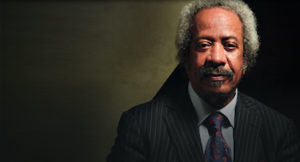
Allen Toussaint
*Allen Toussaint was born on this date in 1937. He was a Black singer, musician, and composer.
From New Orleans, Louisiana, Allen Richard Toussaint was drawn to the piano as early as 6, after his aunt sent an old upright to his family’s house for his sister to study. He quickly made sense of the instrument and began experimenting with everything from Ray Charles to Liberace.
However, it was the keyboard style of New Orleans piano master Professor Longhair that inspired him the most. “That just shocked me, to hear the piano go like that,” Toussaint once told Keyboard magazine. “Professor Longhair had another reason and rhyme for everything. His language, speed of operation, mobility, everything was totally different.” Producer Dave Bartholomew, best known for multiple million-selling hits with Fats Domino, asked Toussaint to sit on some of Domino’s recording sessions in the late 1950s.
Toussaint’s first album, “The Wild Sound of New Orleans,” did not yield any national hits but established his reputation as a formidable pianist and songwriter. It also included two critical instrumentals: “Java,” which New Orleans trumpeter Al Hirt turned into a Top 5 hit in 1964, and “Whipped Cream,” which another trumpeter, Herb Alpert, did with his group the Tijuana Brass. “Whipped Cream” eventually became the theme song for the TV show “The Dating Game.” In the 1960s, Toussaint’s multifaceted talent came into play as he wrote, arranged, produced, and performed on scores of recording sessions by New Orleans artists. “His greatest contribution was in not allowing the city’s old-school R&B traditions to die out … by keeping pace with developments in the rapidly evolving worlds of soul and funk,” states Toussaint’s biography at the Rock and Roll Hall of Fame.
In 1971, the Band’s Robbie Robertson enlisted Toussaint to assemble a horn section to accompany the group for a series of year-end shows, from which the group’s Top 10 live album, “Rock of Ages,” emerged. A quarter century later, Robertson gave the induction speech when Toussaint was elected to the Rock and Roll Hall of Fame. Working with other musicians often meant he had little time to make his records. Yet the title song of one of his recordings, “Southern Nights,” caught the attention of songwriter Jimmy Webb, who had written many of Glen Campbell’s career-making hits.
He suggested the singer-guitarist-TV show host record it, and it gave Campbell a No. 1 hit. Campbell’s sprightly version had a different feel than the liquid gentility of the original, which became Toussaint’s signature song. In concert, Toussaint would stretch the song out for 10 or 15 minutes, sharing stories of his childhood in New Orleans, regaling audiences with his seductive, honeysuckle voice, and incorporating old jazz standards and classical piano pieces with his music.
Paul McCartney, the Rolling Stones, Paul Simon, Fats Domino, Elvis Costello, and others arrived at his door to borrow his signature touch as a producer on their records. Dozens, if not hundreds, of musicians recorded his songs. Toussaint had a hand in such hits as Benny Spellman’s (and later the Rolling Stones and Robert Plant and Alison Krauss’) “Fortune Teller,” Ernie K-Doe’s “Mother-in-Law,” Lee Dorsey’s “Ya-Ya” and “Working in the Coal Mine,” Irma Thomas’ “It’s Raining,” Al Hirt’s “Java,” Dr. John’s “Right Place, Wrong Time,” Glen Campbell’s “Southern Nights,” the Pointer Sisters' “Yes We Can Can” and LaBelle’s disco hit “Lady Marmalade.” In recent decades, his recordings have been sampled by a broad swath of hip-hop acts.
Like tens of thousands of others driven from their New Orleans homes, Toussaint had to abandon his beloved hometown in the wake of Hurricane Katrina. Rather than expressing bitterness or anger at all he and others had lost, he remained buoyant. “I know that for anything this bad to happen, there has to be something just as good coming along to balance it out.” Toussaint was a key figure in restoring hope in the aftermath of Katrina.
He teamed with Costello on the first significant recording session after the hurricane, recording the widely praised album “The River in Reverse,” which confronted the issues and emotions that welled up after the disaster. He also performed at the first big musical event after the hurricane: the 2006 edition of the annual New Orleans Jazz & Heritage Festival. And 13 months after Katrina, he and New Orleans singer Irma Thomas were invited by producer Ken Ehrlich to sing the national anthem at the first NFL game in the renovated Superdome, which had served as an emergency shelter for thousands of displaced residents.
Allen Toussaint died on November 9th, 2015, at 77, of a heart attack after a performance in Madrid. He was a key architect of the early rock and R&B music that flowed from New Orleans to the national stage, an artist whose widespread influence led to his eventual status as a patriarch of the city’s fertile musical mash-up. “One of the greatest songwriters New Orleans ever produced,” Rolling Stones guitarist and songwriter Keith Richards said after Toussaint’s death. McCartney, who brought Toussaint into work on his 1975 solo album “Venus and Mars,” posted a statement on his website calling him “a sweet and gentle guy... His songs will be cherished by people like me who will have fond memories of Allen forever.” Johnny Cash’s daughter, singer-songwriter Rosanne Cash, called his death “an irreplaceable loss.”